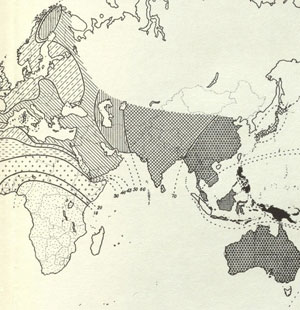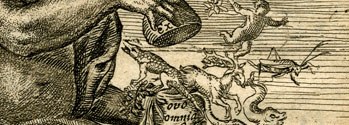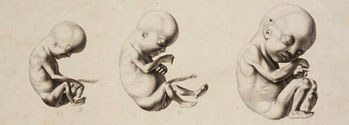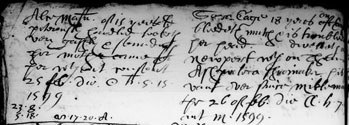28–30 June 2012
Department of History and Philosophy of Science, University of Cambridge
 The postwar study of human heredity was shaped by an array of fields engaged with the study of human populations, including cytogenetics, physical anthropology, epidemiology, public health and demography. This workshop will address the continuities in population thinking across these fields, and the shared practices, institutional structures and analytical and organisational technologies that constituted postwar human heredity.
The postwar study of human heredity was shaped by an array of fields engaged with the study of human populations, including cytogenetics, physical anthropology, epidemiology, public health and demography. This workshop will address the continuities in population thinking across these fields, and the shared practices, institutional structures and analytical and organisational technologies that constituted postwar human heredity.
The workshop aims to bring into view how human populations were shaped through sampling protocols and technologies of data organization. It will emphasize the roles of international organizations, such as the World Health Organization, in promoting and coordinating collection practices across different disciplines and countries. It will also recover the ways in which data and samples were negotiated by researchers with different interests, and re-appropriated in disciplinarily diverse research programmes.
The workshop is supported by the Wellcome Trust, the Genetics Society and by the Wellcome Trust Strategic Award in the History of Medicine on the theme Generation to Reproduction (awarded to the Department of History and Philosophy of Science and colleagues in Classics, Geography, History, King's and Physiology, Development & Neuroscience, University of Cambridge).
Convened by Jenny Bangham (University of Cambridge) and Soraya de Chadarevian (University of California, Los Angeles).
Thursday 28 June
The genetics of human populations
| 14:00 |
Veronika Lipphardt (Max Planck Institute for the History of Science, Berlin): Studies of human variation after 1945: genetics, anthropology and public health |
| 14:45 |
Lisa Gannett (Saint Mary's University, Halifax): 'Population', 'ethnicity', and 'race' in genetics |
| 15:30 |
Coffee and tea |
Genetics, populations, public health
| 16:00 |
Soraya de Chadarevian (University of California, Los Angeles): Chromosome surveys of human populations: between epidemiology and anthropology |
| 16:45 |
Edna Suarez (Universidad Nacional Autónoma de México): Indigenous populations in Mexico: medical genetics and cultural anthropology in the work of Ruben Lisker in the 1960s |
| 17:30 |
Susanne Bauer (Goethe-Universität Frankfurt): Mutations in Soviet public health: post-Lysenko medical genetics and epidemiology, 1969–1991 |
| 18:15 |
Discussion |
| 19:00 |
Dinner |
Friday 29 June
Sampling and collecting
| 09:30 |
Jenny Bangham (University of Cambridge): Sampling practices and institutional networks in postwar blood-group anthropology in Britain, 1946–1956 |
| 10:15 |
Joanna Radin (University of Pennsylvania): Standardizing variation: World Health Organization working groups and human tissue collection, 1958–1970 |
| 11:00 |
Coffee and tea |
| 11:30 |
Alexandra Widmer (Max Planck Institute for the History of Science, Berlin): Of indigenous knowledge and Melanesian blood: Carleton Gadjusek's research practices on blood and genetic diversity in the Western Pacific Islands (1960s–1970s) |
Heredity and demography
| 12:15 |
Edmund Ramsden (University of Exeter): Postwar British demography: survey technologies of the UK Population Investigation Committee |
| 13:00 |
Lunch |
Heredity in the clinic
| 15:00 |
María Jesús Santesmases (Centro de Ciencias Humanas y Sociales, CSIC, Madrid): Prenatal testing and the autonomous karyotype: children, pregnant women, and early Down syndrome cytogenetics, 1962–1975 |
| 15:45 |
Ilana Löwy (Centre de Recherche Medicine, Science Santé et Societé, Paris): How genetics came to the unborn: 1960–1990 |
| 16:30 |
Coffee and tea |
| 17:00 |
Susan Lindee (University of Pennsylvania): Respondent |
| |
Discussion |
| 19:30 |
Dinner and further discussion |
Saturday 30 June
| 09:30–12:00 |
General discussion re: Studies Special Issue (speakers only) |
| 12:00 |
Lunch |
 The postwar study of human heredity was shaped by an array of fields engaged with the study of human populations, including cytogenetics, physical anthropology, epidemiology, public health and demography. This workshop will address the continuities in population thinking across these fields, and the shared practices, institutional structures and analytical and organisational technologies that constituted postwar human heredity.
The postwar study of human heredity was shaped by an array of fields engaged with the study of human populations, including cytogenetics, physical anthropology, epidemiology, public health and demography. This workshop will address the continuities in population thinking across these fields, and the shared practices, institutional structures and analytical and organisational technologies that constituted postwar human heredity.


